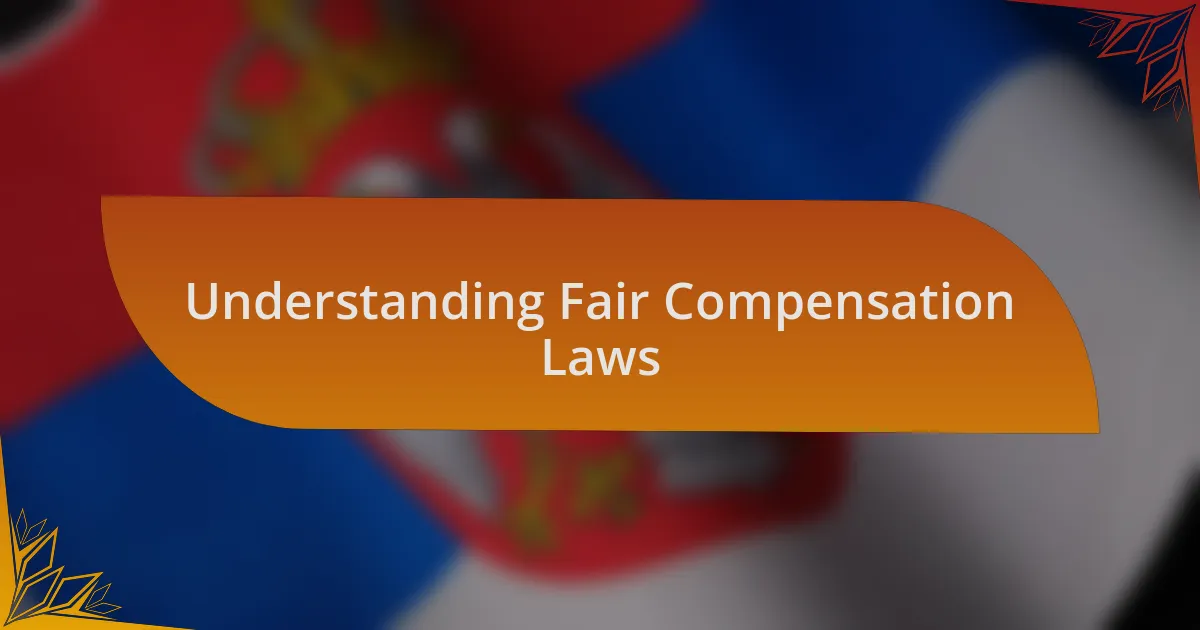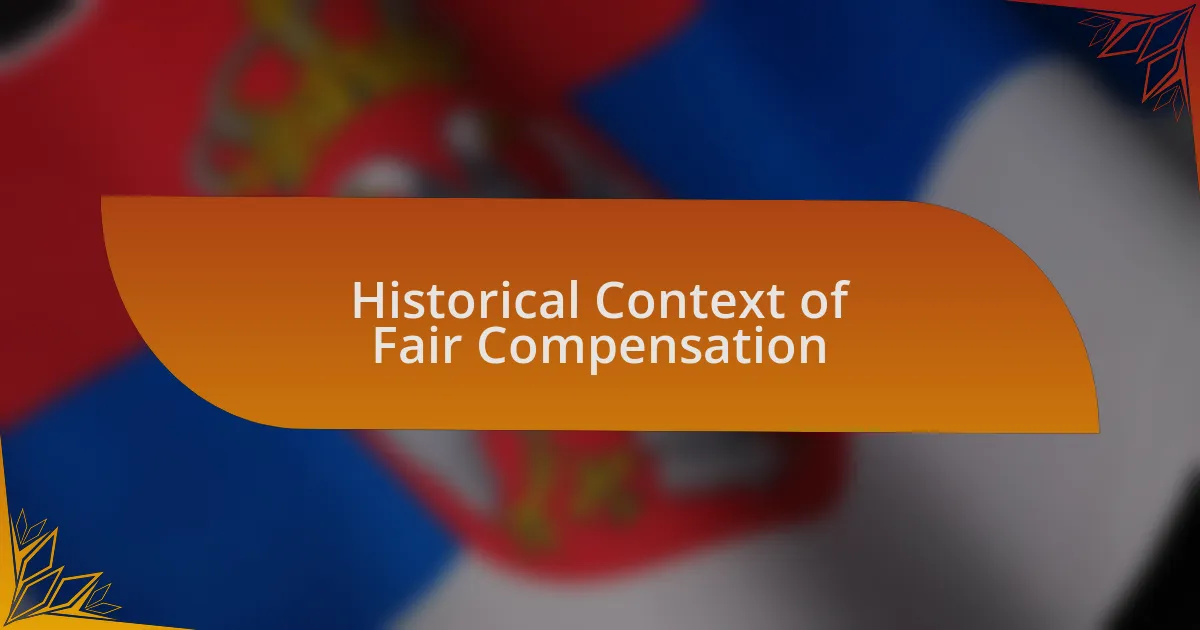Key takeaways:
- Fair compensation laws are essential for addressing systemic injustices, ensuring victims receive justice and recognition for their suffering.
- Reparations politics plays a vital role in acknowledging historical injustices, fostering public discourse on equity, and empowering affected communities.
- Historical promises of compensation, such as “forty acres and a mule,” highlight the gap between intention and action, reinforcing the need for ongoing reparations discussions.
- Current fair compensation laws vary significantly, influenced by local political climates, reflecting diverse attitudes toward reparative justice across states.

Understanding Fair Compensation Laws
Fair compensation laws aim to ensure that individuals receive just remuneration for their losses or injuries, especially when those losses stem from systemic injustices. I remember a case where a friend struggled for years to get compensated after being wrongfully terminated due to racial discrimination. It struck me how complex the legal jargon surrounding these laws can be, often leaving victims feeling confused and unsupported.
The intricacies of fair compensation laws can often seem daunting. Have you ever wondered why some victims receive fair compensation while others don’t? I’ve witnessed firsthand how important legal representation is; it can turn the tide for those seeking justice. Navigating these laws requires a thorough understanding of how they intersect with broader societal issues, which can feel overwhelming.
Moreover, fair compensation isn’t just about money; it encompasses acknowledging the pain and suffering individuals have endured. During discussions at community forums, I’ve seen strong emotions surface when people share their stories about how inadequate compensation has affected their lives. It’s a stark reminder that financial equity is a vital component of social justice, and understanding these laws is crucial for anyone seeking fairness.

Importance of Reparations Politics
The importance of reparations politics cannot be overstated, as it serves as a means to confront historical injustices that continue to impact communities today. When I talk to individuals who have been affected by discriminatory policies, I am often struck by their resilience and the deep-seated need for acknowledgment of their pain. Isn’t it crucial for society to recognize that financial reparations are not just about restoring lost wealth, but also about healing and empowerment?
Moreover, reparations politics plays a pivotal role in shaping public discourse around equity and justice. I recall a heated community meeting where someone passionately argued that reparations could pave the way for a more inclusive society. This discussion opened my eyes to the potential for reparations to challenge systemic disparities, creating a future where every individual has an equitable chance to thrive, rather than being held back by their past.
Ultimately, engaging in reparations politics allows us to redefine our understanding of justice. I’ve observed how conversations surrounding reparations can elicit hope and a desire for change; it’s both an opportunity and a responsibility. What if we viewed reparations not just as compensation for past wrongs, but as a powerful tool for building a more just world? This shift in perspective could inspire action not only from policymakers but from each of us as engaged citizens.

Historical Context of Fair Compensation
Throughout history, the concept of fair compensation has often emerged in response to injustices that left deep scars on communities. I remember reading about the post-Civil War era when the idea of “forty acres and a mule” was introduced as a promise to freed slaves, a symbol of hope for land ownership and economic independence. Yet, this promise was largely unfulfilled, reflecting a broader pattern where intentions rarely translated into action. How do we reconcile such unfulfilled commitments with the ongoing calls for reparations today?
In the early 20th century, we witnessed movements advocating for reparations for various groups impacted by atrocities, such as the Holocaust survivors receiving compensation from the German government. This context highlighted the global recognition of the need for reparative justice and the complexities in implementing fair compensation. It’s fascinating to explore how different countries have approached reparations—what worked, what didn’t, and why the dialogue has shifted over time. Have we learned enough from these historical instances, or are we repeating the same mistakes?
More recently, discussions surrounding reparations in the United States have intensified, not just as a financial obligation but as a moral imperative. I find it incredibly powerful when community members share their personal stories about the ongoing impact of systemic racism and economic disenfranchisement. These narratives remind us that fair compensation is not merely an abstract concept; it is entwined with real lives and the quest for dignity and recognition. How can we ignore the voices of those who continue to advocate for reparation discussions, driven by their experiences and hopes for a more equitable future?

Current Fair Compensation Laws
Current Fair Compensation Laws vary widely across states and jurisdictions, often influenced by local political climates and historical context. For instance, California recently enacted a reparations task force aimed at assessing the lingering effects of slavery and proposing policies for compensation. I remember the excitement in the community when the legislation was announced; it felt like a significant step towards acknowledgment and justice. Why is it that some states are willing to take such milestones while others lag behind?
In contrast, recent federal proposals have faced intensive debates, revealing divides in opinions on the validity of reparations. My conversations with friends from different backgrounds have highlighted how personal experiences can shape one’s views on fair compensation. Some see it as a necessary step towards healing, while others view it with skepticism. Are we truly ready to embrace the complexities that come with implementing such laws?
One poignant example of fair compensation can be seen in the case of Japanese American internment during World War II, where survivors received reparations decades later. This history reminds us of how long these discussions can take and the emotional toll that inaction has on communities. Reflecting on this, I often wonder, how does a community regain trust after being overlooked for so long?

Personal Advocacy for Fair Compensation
Advocating for fair compensation on a personal level often begins with conversations in our immediate circles. I vividly recall discussing these issues with my family over dinner, where differing opinions revealed not just perspectives but deep emotional scars rooted in history. It made me realize that advocating for fair compensation isn’t merely policy work; it’s about connecting with people’s lived experiences and igniting a collective desire for justice. How can we engage those who feel indifferent to these discussions?
On another occasion, I attended a local community meeting aimed at addressing compensation matters for marginalized groups. The palpable energy in the room, with stories shared from the heart, highlighted the raw urgency of our advocacy. I felt inspired by the courage of those who spoke, reminding me that each narrative matters in the broader push for change. Isn’t it fascinating how personal stories can shift the narrative and galvanize action?
Ultimately, personal advocacy also means standing firm in the public space. When I participated in a rally for fair compensation, I felt a mix of pride and determination. We carried banners and chanted, united in purpose, reflecting the hopes of generations demanding acknowledgment. It struck me then that personal advocacy transcends individual efforts; it’s about creating a movement that resonates with the community’s collective pain and aspirations. How do we harness that energy into sustained action?